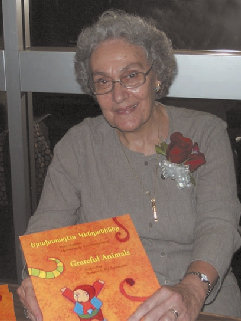Lori Havatian
Staff Writer

Throughout the years “Musa Daghtsis,” the people who originated from the region of Musa Dagh (made famous for their defense of the Turks and from the famous book, Forty Days of Musa Dagh by Franz Werfel), have told folk tales to not only educate the young but also entertain all. Sona Zeitlian, a graduate from the American University of Cairo, spends most of her time collecting folk tales that once were enhanced by imagination and now have been left for the present generation to share with the rest of the world. The folk tales embody traditions that kept the spirit of Musa Dagh alive.
Mrs. Zeitlian was born in Cairo, Egypt, but political turmoil in the early 1960s forced her and her family to leave for Lebanon, and finally to California. She has held teaching posts in Cairo and Beirut. During the early 1960’s Zeitlian recorded some of the tales for the first time. She collected about 300 tales that are retold now in Western Armenian. She has published them as The Folktales of Musa Dagh, based on the oral tradition that she recorded for the first time in Anjar, Lebanon.
Story-tellers, mostly men, would open the minds of the listener to a new world full of adventure and morality. It was the best medicine for a cold winter’s night. Covering the windows would give the tales a more dramatic effect so the first light would not interrupt. It was believed that certain stories called “koushmas” could do the impossible, for example, they had the ability to comfort the sick and help cure people who had an evil spirit. This was believed to be true if the sick people were prayed over for seven days and seven nights, without interruption.
The Musa Dagh folk heroes resemble the heroes we as Americans grew up with. You have the occasional king or the heroic prince or even the damsel in distress represented by the princess. Most stories would feature a “zmranka” which was a magical bird who always seemed to know who was good and who was evil. Some characteristics of the heroes in the folk tales are: proud, daring, confident, risk takers, or simply a person on a quest for a gift.
Two stories that Mrs. Zeitlian related have remained in my mind. One was called “Three Temptations.” A man leaves his family due to work and years later finally comes home to see a younger man sleeping next to his wife. As the man ran to get his gun to shoot his promiscuous wife he remembers that it was his son who he has not seen for quite a while. The tale combined sensitivity and emotions such as love, hate, envy and greed.
The second story, which was my favorite, begins with a bride’s ability to see whether or not a deceased person will go to heaven or perish in hell. When the bride’s father-in-law passes away she sees evil spirits. She put all her trust in the “koushmas” and wanted to recite them for seven days and seven nights. On the sixth night she was very tired so her husband took over for her. He fell asleep and was unable to complete the ritual so the father-in-law passed away. He felt very guilty and because of his uncontrollable emotions, stabbed his wife to death.
Adults can take these stories that have been passed down by generation to generation and examine the depth, emotion and, creativity that was put into each and every story. If you take apart, line by line, the memories, then images of the past will come pouring through. As a young woman with Musa Daghtsi roots I am speechless. Mrs. Zeitlian opened new doors for me. I for once am very interested in learning about where and how these folk traditions were communicated and what I can do to help them stay actively alive.
Mrs. Zeitlian stated that most Musa Daghtsis are now living in a cosmopolitan setting. I witnessed a lady about the age of my grandmother, who was born and raised in Lebanon, conversing on her cellular phone and wearing a pin that supported the American troops. Traditions are there to carry customs of what once was. To share them with the people that once did what they did. Stories are told to keep these traditions alive and we, as young Armenians should strive to keep every kind of Armenian tradition alive. We, the next generation of Armenian men and women will play an important role in the continuance of these traditions.
Mrs. Zeitlian ended the evening with a very interesting quote, “It is yesterday’s ember that will kindle tomorrow’s fire.” Shared traditions make not only the people of Musa Dagh, but also everyone else around have memories that will be carried on forever.
 Hye Sharzhoom Armenian Action
Hye Sharzhoom Armenian Action